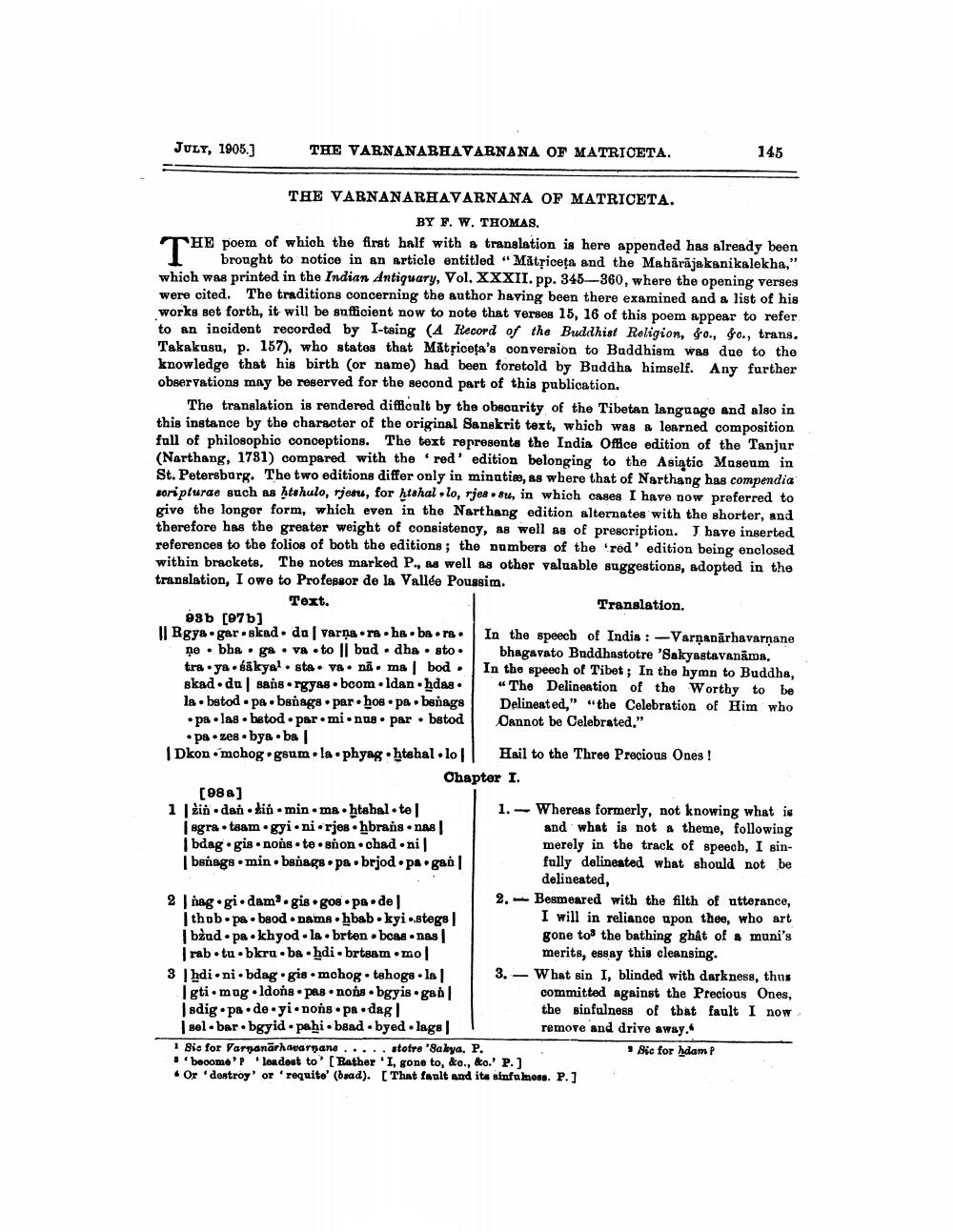________________
JULY, 1905.]
THE VARNANARHAVARNANA OF MATRICETA.
THE VARNANARHAVARNANA OF MATRICETA. BY F. W. THOMAS.
HE poem of which the first half with a translation is here appended has already been
to notice in an article entitled "Matriceța and the Maharajakanikalekha,"
which was printed in the Indian Antiquary, Vol. XXXII. pp. 345-360, where the opening verses were cited. The traditions concerning the author having been there examined and a list of his works set forth, it will be sufficient now to note that verses 15, 16 of this poem appear to refer to an incident recorded by I-tsing (A Record of the Buddhist Religion, &o., &c., trans. Takakusu, p. 157), who states that Matriceta's conversion to Buddhism was due to the knowledge that his birth (or name) had been foretold by Buddha himself. Any further observations may be reserved for the second part of this publication.
The translation is rendered difficult by the obscurity of the Tibetan language and also in this instance by the character of the original Sanskrit text, which was a learned composition full of philosophic conceptions. The text represents the India Office edition of the Tanjur (Narthang, 1781) compared with the 'red' edition belonging to the Asiatic Museum in St. Petersburg. The two editions differ only in minutiae, as where that of Narthang has compendia seripturae such as htshulo, rjesu, for htshallo, rjes. su, in which cases I have now preferred to give the longer form, which even in the Narthang edition alternates with the shorter, and therefore has the greater weight of consistency, as well as of prescription. J have inserted references to the folios of both the editions; the numbers of the 'red' edition being enclosed within brackets. The notes marked P., as well as other valuable suggestions, adopted in the translation, I owe to Professor de la Vallée Poussim.
Text.
·
•
•
98b [97b] ||Bgya gar skad da varna ra ha bara. ne bha ga va to || buddha sto. tra.ya. sakya1. sta va na ma | bod skad du sans rgyas bcom. Idan.hdas. la batod pa bsnags par hos pa bsnags ⚫pa las batod. par minus par bstod pazes bya.ba |
•
·
•
| Dkon mchog gsum la phyag⚫htshal.lo
[98a]
1 | zin.dań.kin. min. ma⚫htshal.tel Isgra⚫tsam. gyi ni rjes hbrans nas | | bdag gis.nons te snon chad ni bsnags.min. bsnags. pa brjod pagan |
Chapter I.
•
2 | nag gi dam3.gis. gos pa.de] thub.pa.baod nams. hbab kyistegs | baud pakhyod la brten bcas⚫ nas | Irab tu bkru ba hdi. brtsam mo
3 hdi ni bdag gis.mchog tahogs.la | Igti mug.ldons pas nons.bgyis gai| Isdig pa de.yi.nons.pa.dag]
Isel bar bgyid. pahi bead. byed.lags |
145
Translation.
In the speech of India: -Varṇanärhavarṇane bhagavato Buddhastotre 'Sakyastavanāma. In the speech of Tibet; In the hymn to Buddha, "The Delineation of the Worthy to be Delineated," "the Celebration of Him who Cannot be Celebrated."
Hail to the Three Precious Ones!
1. Whereas formerly, not knowing what is and what is not a theme, following merely in the track of speech, I sinfully delineated what should not be delineated,
2. Besmeared with the filth of utterance, I will in reliance upon thee, who art gone to the bathing ghât of a muni's merits, essay this cleansing.
3.
What sin I, blinded with darkness, thus committed against the Precious Ones, the sinfulness of that fault I now remove and drive away.
• Sic for hdam ?
1 Sic for Varnanarhavarnane..... stotre 'Sakya. P. become leadest to' [Rather I, gone to, &o., &o.' P.]
Or 'destroy' or 'requite' (bead). [That fault and its sinfumoss. P.]




